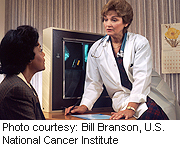
TUESDAY, Sept. 20 (HealthDay News) — Black women who develop breast cancer are more likely than white women to suffer a second cancer in the other breast, and those who are diagnosed under age 45 are more likely to get a primary breast cancer of a more aggressive form, new research indicates.
“When the disease does occur in blacks early on, it tends to be more aggressive, more likely to be estrogen-receptor negative and it is more likely to cause death,” study lead researcher Hala Nsouli-Maktabi, a Ph.D. graduate of the George Washington University, said in a news release from the American Association for Cancer Research.
The investigators also found that overall diagnoses of breast cancer are higher in whites compared to blacks. That’s because most breast cancer is diagnosed at an older age, when it’s more commonly found in white women than black women, they explained.
“While the incidence of breast cancer is generally higher among whites for first-time diagnosis, we found the incidence of the second contralateral diagnosis was higher among blacks,” said Nsouli-Maktabi, referring to a later diagnosis of cancer in the other breast. “This was unexpected — blacks usually have a higher mortality rate than whites from the first cancer, so you would expect blacks to have lower rates of second cancers. Usually, about 4 percent of all breast cancer patients will present with a second primary cancer contralaterally.”
For the study, the researchers analyzed data from a registry of 415,664 white women and 39,887 black women diagnosed with primary breast cancer at age 19 or older.
Just under 41 percent developed a second primary breast cancer, of which 4 percent occurred in the opposite breast.
“This should alert the physician to watch patients very carefully,” Nsouli-Maktabi explained in the news release. “A cancer in one breast should lead to a careful examination of the other breast over a long period, just in case a cancer develops.”
The study findings were slated to be presented Monday at the American Association for Cancer Research Conference on the Science of Cancer Health Disparities in Washington D.C. The data and conclusions should be viewed as preliminary until published in a peer-reviewed journal.
More information
The American Cancer Society has more about breast cancer.

